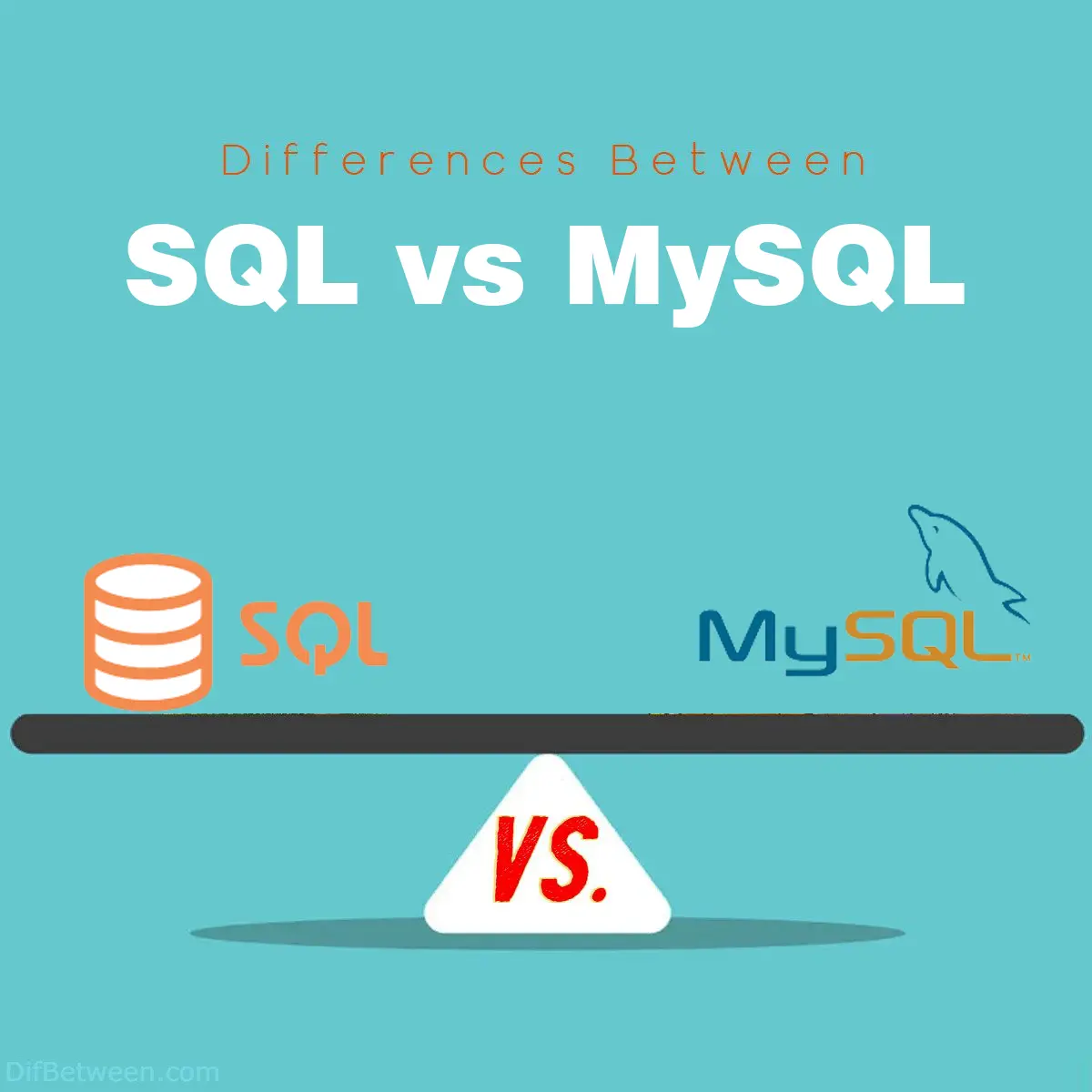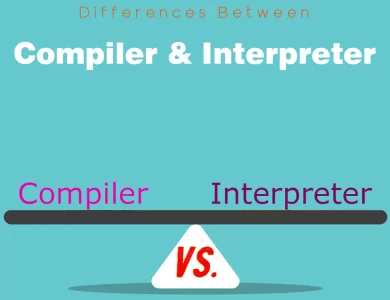
| Aspect | SQL | MySQL |
|---|---|---|
| Definition | Universal language for managing databases | Specific Relational Database Management System |
| Ownership | Not owned by any entity | Owned by Oracle Corporation |
| Implementation Variety | Common SQL concepts apply across systems | MySQL introduces MySQL-specific functionalities |
| Performance | Depends on the specific database system | Offers multiple storage engines for optimization |
| Data Storage and Types | Focuses on querying; abstracts data storage | Handles data storage directly with various types |
| Scalability | Scaling can be challenging | Evolved to offer horizontal scaling and replication |
| Community | Wide community from various database users | Dedicated community focused on MySQL ecosystem |
| Integration | Cross-platform capabilities | Seamless integration with web applications |
| Use Cases | Versatile across industries | Dominant choice for web-based applications |
| Future Outlook | Established legacy | Continues to evolve with Oracle’s support |
As we embark on a journey through the fascinating realm of databases, we find ourselves at the crossroads of SQL and MySQL. These two powerhouses have transformed the way we manage, store, and retrieve data. Let’s delve into the captivating world of their key differences, as if I were your friendly guide.
Differences Between SQL and MySQL
SQL and MySQL are often intertwined in the realm of databases, but they bear distinct characteristics. SQL stands as a universal querying language across various database systems, while MySQL, a robust Relational Database Management System (RDBMS), employs SQL as its language. While SQL provides versatility and adaptability, MySQL shines in web application integration and scalability. Understanding these differences empowers you to choose the right tool for your data-related journey.
1. Nature of the Beast: SQL vs. MySQL
SQL: Universal Language
SQL, as a language, stands above specific implementations. It’s a standardized way to communicate with relational databases. Think of it as the recipe book for preparing various database tasks. SQL doesn’t belong to a single database; rather, it’s adopted by multiple database systems, each implementing it in their own way.
MySQL: A Flavor of SQL
MySQL, in contrast, is a specific RDBMS that employs SQL for its operations. It’s like a unique dish prepared using the universal recipe of SQL. MySQL takes SQL’s syntax and features and implements them in a way that aligns with its capabilities. In essence, MySQL is an instance where SQL comes to life.
2. Ownership and Licensing
SQL: Language, Not a Product
SQL isn’t owned by any specific entity. It’s a language standard maintained by the American National Standards Institute (ANSI) and the International Organization for Standardization (ISO). As such, it’s open and available for anyone to use without the need for licensing or payment.
MySQL: Oracle’s Creation
MySQL, however, is owned by Oracle Corporation, a giant in the tech industry. While MySQL itself comes in both open-source and commercial editions, Oracle retains ownership over the entire MySQL ecosystem. This distinction can influence factors such as support, updates, and licensing costs.
3. Implementation Variety
SQL: Many Doors, One Path
SQL is the common thread that runs through various relational database systems. Whether you’re dealing with PostgreSQL, Microsoft SQL Server, SQLite, or others, the core SQL concepts remain relatively consistent. This means that if you’re well-versed in SQL, you can adapt to different database systems more easily.
MySQL: One Distinct Flavor
MySQL, being a specific RDBMS, has its own unique set of features and optimizations. While it adheres to the SQL standard, it also introduces some MySQL-specific functionalities. This means that while your SQL skills remain valuable, you’ll need to acquaint yourself with MySQL’s nuances to leverage its full potential.
4. Performance and Optimization
SQL: Dependent on Implementation
The performance of SQL queries can vary widely depending on the database system you’re using. Different databases have different query optimizers, indexing mechanisms, and storage engines, all of which influence how quickly your queries are executed. SQL itself doesn’t guarantee performance; it’s how a particular database system handles and optimizes SQL queries that matters.
MySQL: Engine Matters
MySQL places a strong emphasis on performance. It offers multiple storage engines, each optimized for specific use cases. The well-known InnoDB engine, for instance, is ACID-compliant and excels in transactional scenarios, while the MyISAM engine is better suited for read-heavy workloads. This flexibility empowers developers to choose the right engine for their specific application, fine-tuning performance to their needs.
5. Data Storage and Types
SQL: Data Agnostic
SQL, as a querying language, doesn’t concern itself with the underlying data types and storage details of a specific database. It offers a consistent way to define, manipulate, and retrieve data regardless of how it’s stored. This abstraction allows you to focus on the logic of your queries rather than the nitty-gritty storage aspects.
MySQL: Data Specifics
MySQL, being a database system, handles data storage directly. It provides a range of data types, from integers and strings to more specialized types like dates, times, and spatial data. This means that when working with MySQL, you’ll need to consider data type compatibility, storage requirements, and indexing strategies to optimize your database’s performance.
6. Scalability Options
SQL: Scaling Challenges
Traditional SQL databases, often referred to as relational databases, can face challenges when it comes to scaling. As the volume of data and user requests grows, maintaining high performance and availability becomes more complex. While there are techniques to scale relational databases, such as sharding and replication, these often require careful planning and architectural adjustments.
MySQL: Scalability Advancements
MySQL has evolved to address scalability concerns. MySQL Cluster and MySQL Fabric provide options for horizontal scaling and high availability. Additionally, MySQL’s support for replication and clustering allows you to distribute the load and ensure redundancy. While challenges still exist, MySQL’s focus on scalability sets it apart from the generic SQL landscape.
7. Community and Support
SQL: Wide Community
SQL benefits from a massive user community due to its universality. Developers, database administrators, and data enthusiasts from various database systems come together to discuss best practices, share insights, and troubleshoot challenges related to SQL. This diverse community ensures that solutions and knowledge are readily available.
MySQL: Dedicated Community
MySQL boasts a vibrant and dedicated community specific to its ecosystem. With its popularity among web applications, MySQL enthusiasts collaborate to enhance its features, address bugs, and develop tools that align with MySQL’s capabilities. This focused community support can be particularly valuable when working with MySQL-specific challenges.
8. Ecosystem and Integration
SQL: Cross-Platform Capabilities
SQL’s cross-platform nature means that skills acquired while working with one database system can often be transferred to another. Once you understand SQL fundamentals, you’ll find it easier to adapt to different databases, making you a versatile data professional.
MySQL: Web Application Integration
MySQL’s seamless integration with web applications is one of its standout features. Many web development frameworks and content management systems have native support for MySQL, simplifying the process of connecting your application to the database. If you’re building web-based solutions, MySQL’s integration capabilities can provide a smoother development experience.
9. Use Cases and Industries
SQL: Versatility Across Industries
SQL’s power lies in its versatility. It’s employed across a multitude of industries for tasks ranging from data analysis and reporting to transaction processing and business intelligence. Whether you’re managing a hospital’s patient records, an e-commerce platform’s inventory, or a financial institution’s transactions, SQL is there to assist.
MySQL: Web Dominance
MySQL has made a significant mark in the web world. It’s the preferred choice for many web-based applications, including content management systems, e-commerce platforms, and social media sites. Its speed and reliability cater well to the demands of these applications, making it a cornerstone of the online realm.
10. Future Outlook
SQL: Time-Tested Legacy
SQL’s legacy is firmly established. It has been the cornerstone of database management for decades, and its principles continue to guide modern database technologies. As long as relational databases remain relevant, SQL will remain an indispensable skill in the world of data.
MySQL: Continued Evolution
MySQL’s journey is also far from over. With Oracle’s backing, it continues to evolve, adapting to changing technological landscapes. As long as web applications thrive and demand robust, high-performance databases, MySQL’s relevance will persist.
SQL or MySQL : Which One is Right Choose for You?
As we stand at the crossroads of database decision-making, the choice between SQL and MySQL looms before us. But fret not, for I am here to be your guiding light through this pivotal decision-making process. Let’s explore the factors that will help you determine which path to tread.
When to Choose SQL
- Versatility Matters: If your goal is to gain a solid understanding of databases and querying language that can be applied across different database systems, SQL is your go-to choice. Its universal nature equips you with skills that transcend specific implementations, making you a versatile data professional.
- Exploring Various Databases: If you envision a journey through diverse database systems like PostgreSQL, SQLite, or Oracle Database, learning SQL is a wise investment. Your SQL knowledge will serve as a bridge, allowing you to adapt your skills to different databases as needed.
- Business Intelligence and Reporting: If your focus lies in data analysis, business intelligence, and generating complex reports, SQL is a powerful tool. Its querying capabilities enable you to mine insights from large datasets and transform raw data into meaningful information.
- Adapting to Changing Landscapes: If you value a skill set that remains relevant despite evolving technologies, SQL is your steady companion. As long as relational databases endure, SQL will continue to guide your data-related endeavors.
When to Choose MySQL
- Web Application Development: If you’re venturing into the world of web application development, MySQL shines brightly. Its seamless integration with web frameworks and content management systems makes it a preferred choice for powering the back-end of web-based applications.
- Speed and Reliability: If your priority is a database that offers high-speed operations and reliability, MySQL fits the bill. Its performance optimization features, such as various storage engines, ensure your application runs efficiently, even under heavy loads.
- Online Ventures and Scalability: If you’re envisioning an online business or platform that demands scalability, MySQL’s advancements in horizontal scaling and clustering make it an attractive option. It’s well-suited for applications that need to grow seamlessly with increasing user demands.
- Collaborative Community: If you value being part of a dedicated community that focuses on MySQL’s ecosystem, you’ll find a welcoming space to share insights, tackle challenges, and contribute to MySQL’s ongoing development.
Making Your Choice
Now that we’ve illuminated the paths of SQL and MySQL, it’s time for you to choose. Consider your aspirations, the type of projects you’ll be working on, and your long-term goals. Are you looking for a broad skill set that transcends databases, or is your heart set on web applications and scalability? Both SQL and MySQL have their merits, and your decision ultimately hinges on your unique journey.
FAQs
SQL, or Structured Query Language, is a standardized language for managing and querying relational databases. It enables users to interact with databases by creating, modifying, and retrieving data using a set of predefined commands.
MySQL is a specific Relational Database Management System (RDBMS) that utilizes SQL as its querying language. It’s known for its speed, reliability, and seamless integration with web applications.
Yes, MySQL employs SQL as its querying language. SQL commands can be used to interact with and manage MySQL databases.
SQL is a universal language for managing databases across various systems, while MySQL is a specific RDBMS that implements SQL. SQL is like the blueprint, and MySQL is the building constructed using that blueprint.
SQL itself is not a product; it’s a language standard. However, many database systems that use SQL, including MySQL, offer open-source versions.
Yes, MySQL is owned by Oracle Corporation. Oracle acquired MySQL as part of its acquisition of Sun Microsystems.
MySQL is often a preferred choice for web applications due to its seamless integration, speed, and reliability, making it a robust backend for online platforms.
Absolutely. SQL skills are transferable across various database systems like PostgreSQL, SQLite, Microsoft SQL Server, and more, allowing you to adapt to different environments.
Yes, SQL benefits from a wide community of data professionals who share insights, best practices, and solutions across different database systems that use SQL.
While MySQL excels in web application development, it can also be used for various other purposes, including data warehousing, analytics, and more, depending on your specific needs.
MySQL has evolved to offer better scalability options, with features like horizontal scaling and clustering, making it suitable for applications that need to handle growing user demands.
Yes, both SQL skills and MySQL expertise remain valuable as long as relational databases and data-driven applications continue to be a part of the technology landscape.
Read More :






